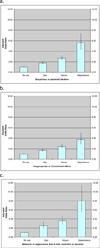Association between cannabis use, psychosis, and schizotypal personality disorder: findings from the National Epidemiologic Survey on Alcohol and Related Conditions
- PMID: 24200416
- PMCID: PMC3877688
- DOI: 10.1016/j.schres.2013.10.018
Association between cannabis use, psychosis, and schizotypal personality disorder: findings from the National Epidemiologic Survey on Alcohol and Related Conditions
Abstract
Background: Studies to date showing an association between cannabis use and schizophrenia-spectrum disorders are of relatively small sample sizes with limitations in generalizability. The present study addresses this gap by examining the relationship between cannabis use and psychotic-like symptoms in a large representative community sample.
Method: Data were derived from the 2004-2005 National Epidemiologic Survey on Alcohol and Related Conditions (NESARC, Wave 2), a large, nationally representative sample of 34,653 adults from the United States population. We evaluated the association between lifetime cannabis use, psychosis, and schizotypal personality features.
Results: The prevalence of psychosis and schizotypal personality disorder increased significantly with greater cannabis use in a dose-dependent manner. The associations between cannabis use and psychosis were 1.27 (95% CI 1.03-1.57) for lifetime cannabis use, 1.79 (95% CI 1.35-2.38) for lifetime cannabis abuse, and 3.69 (95% CI 2.49-5.47) for lifetime cannabis dependence. There was a similar dose-response relationship between the extent of cannabis use and schizotypal personality disorder (OR=2.02 for lifetime cannabis use, 95% CI 1.69-2.42; OR=2.83 for lifetime cannabis abuse, 95% CI 2.33-2.43; OR=7.32 for lifetime cannabis dependence, 95% CI 5.51-9.72). Likelihood of individual schizotypal features increased significantly with increased extent of cannabis use in a dose-dependent manner.
Conclusion: This is the first population-based study to examine the association between lifetime cannabis use, psychosis, and schizotypal personality traits. These results add to evidence that cannabis use may be a risk factor for psychosis liability.
Keywords: Cannabis; Epidemiology; NESARC; Psychosis; Schizotypal.
© 2013 Elsevier B.V. All rights reserved.
Conflict of interest statement
The authors have no conflicts of interest to declare.
Figures

Similar articles
-
Early cannabis use and schizotypal personality disorder symptoms from adolescence to middle adulthood.Schizophr Res. 2012 May;137(1-3):45-9. doi: 10.1016/j.schres.2012.01.019. Epub 2012 Feb 9. Schizophr Res. 2012. PMID: 22325079 Free PMC article.
-
Epidemiology of DSM-5 Drug Use Disorder: Results From the National Epidemiologic Survey on Alcohol and Related Conditions-III.JAMA Psychiatry. 2016 Jan;73(1):39-47. doi: 10.1001/jamapsychiatry.2015.2132. JAMA Psychiatry. 2016. PMID: 26580136 Free PMC article.
-
Cannabis use and age at onset of schizophrenia.Am J Psychiatry. 2004 Mar;161(3):501-6. doi: 10.1176/appi.ajp.161.3.501. Am J Psychiatry. 2004. PMID: 14992976
-
A systematic evidence map of the association between cannabis use and psychosis-related outcomes across the psychosis continuum: An umbrella review of systematic reviews and meta-analyses.Psychiatry Res. 2024 Jan;331:115626. doi: 10.1016/j.psychres.2023.115626. Epub 2023 Nov 30. Psychiatry Res. 2024. PMID: 38096722
-
The psychosis continuum and categorical versus dimensional diagnostic approaches.Curr Psychiatry Rep. 2009 Jun;11(3):179-84. doi: 10.1007/s11920-009-0028-7. Curr Psychiatry Rep. 2009. PMID: 19470278 Review.
Cited by
-
Religiosity and substance use in U.S. adults: Findings from a large-scale national survey.Drug Alcohol Depend. 2021 Aug 1;225:108796. doi: 10.1016/j.drugalcdep.2021.108796. Epub 2021 May 29. Drug Alcohol Depend. 2021. PMID: 34119881 Free PMC article.
-
Association of Cannabis Use-Related Predictor Variables and Self-Reported Psychotic Disorders: U.S. Adults, 2001-2002 and 2012-2013.Am J Psychiatry. 2022 Jan;179(1):36-45. doi: 10.1176/appi.ajp.2021.21010073. Epub 2021 Oct 14. Am J Psychiatry. 2022. PMID: 34645275 Free PMC article.
-
Medical marijuana laws and adolescent marijuana use in the USA from 1991 to 2014: results from annual, repeated cross-sectional surveys.Lancet Psychiatry. 2015 Jul;2(7):601-8. doi: 10.1016/S2215-0366(15)00217-5. Epub 2015 Jun 15. Lancet Psychiatry. 2015. PMID: 26303557 Free PMC article.
-
Personality Traits and Psychotic Proneness Among Chronic Synthetic Cannabinoid Users.Front Psychiatry. 2020 May 15;11:355. doi: 10.3389/fpsyt.2020.00355. eCollection 2020. Front Psychiatry. 2020. PMID: 32477173 Free PMC article.
-
Prevalence and Correlates of DSM-5 Cannabis Use Disorder, 2012-2013: Findings from the National Epidemiologic Survey on Alcohol and Related Conditions-III.Am J Psychiatry. 2016 Jun 1;173(6):588-99. doi: 10.1176/appi.ajp.2015.15070907. Epub 2016 Mar 4. Am J Psychiatry. 2016. PMID: 26940807 Free PMC article.
References
-
- Agosti V, Nunes E, Levin F. Rates of psychiatric comorbidity among U.S. residents with lifetime cannabis dependence. Am J Drug Alcohol Abuse. 2002;28(4):643–652. - PubMed
-
- Ahmed AO, Green A, Goodrum NM, Doane NJ, Birgenheir D, Buckley PF. Does a latent class underlie schizotypal personality disorder? Implications for schizophrenia. J Abnorm Psychol. 2013;122(2):475–491. - PubMed
-
- Ameri A. The effects of cannabinoids on the brain. Prog Neurobiol. 1999;58(4):315–348. - PubMed
-
- American Psychiatric Association. Diagnostic and Statistical Manual of Mental Disorders. Washington, DC: 1994.
-
- Andreasson S, Allebeck P, Engstrom A, Rydberg U. Cannabis and schizophrenia. A longitudinal study of Swedish conscripts. Lancet. 1987;2(8574):1483–1486. - PubMed
Publication types
MeSH terms
Grants and funding
- MH076051/MH/NIMH NIH HHS/United States
- K02 DA023200/DA/NIDA NIH HHS/United States
- R01 MH076051/MH/NIMH NIH HHS/United States
- R01 MH081011/MH/NIMH NIH HHS/United States
- DA019606/DA/NIDA NIH HHS/United States
- DA023200/DA/NIDA NIH HHS/United States
- DA023973/DA/NIDA NIH HHS/United States
- MH082773/MH/NIMH NIH HHS/United States
- R01 DA019606/DA/NIDA NIH HHS/United States
- T32 DA007294/DA/NIDA NIH HHS/United States
- K24 DA029647/DA/NIDA NIH HHS/United States
- R01 MH082773/MH/NIMH NIH HHS/United States
- MH081011/MH/NIMH NIH HHS/United States
- R01 DA023973/DA/NIDA NIH HHS/United States
- DA007294/DA/NIDA NIH HHS/United States
LinkOut - more resources
Full Text Sources
Other Literature Sources
Medical
Miscellaneous

